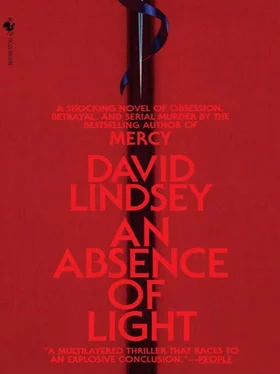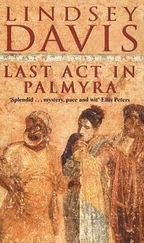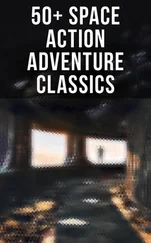David Lindsey - An Absence of Light
Здесь есть возможность читать онлайн «David Lindsey - An Absence of Light» весь текст электронной книги совершенно бесплатно (целиком полную версию без сокращений). В некоторых случаях можно слушать аудио, скачать через торрент в формате fb2 и присутствует краткое содержание. Жанр: Полицейский детектив, на английском языке. Описание произведения, (предисловие) а так же отзывы посетителей доступны на портале библиотеки ЛибКат.
- Название:An Absence of Light
- Автор:
- Жанр:
- Год:неизвестен
- ISBN:нет данных
- Рейтинг книги:5 / 5. Голосов: 1
-
Избранное:Добавить в избранное
- Отзывы:
-
Ваша оценка:
- 100
- 1
- 2
- 3
- 4
- 5
An Absence of Light: краткое содержание, описание и аннотация
Предлагаем к чтению аннотацию, описание, краткое содержание или предисловие (зависит от того, что написал сам автор книги «An Absence of Light»). Если вы не нашли необходимую информацию о книге — напишите в комментариях, мы постараемся отыскать её.
An Absence of Light — читать онлайн бесплатно полную книгу (весь текст) целиком
Ниже представлен текст книги, разбитый по страницам. Система сохранения места последней прочитанной страницы, позволяет с удобством читать онлайн бесплатно книгу «An Absence of Light», без необходимости каждый раз заново искать на чём Вы остановились. Поставьте закладку, и сможете в любой момент перейти на страницу, на которой закончили чтение.
Интервал:
Закладка:
Graver would not have chosen Arthur Tisler if he had been asked to imagine this. Of all the men and women who worked under him, Tisler seemed the least remarkable, the least likely to have “things happen” to him. Arthur Tisler was the quintessential invisible man, and invisible men lived their lives without creating eddies of air around themselves; they died without incident, and in no time at all people found themselves saying, Arthur Tisler, my God, I haven’t thought of him in years.
Uninteresting was not a word inherently descriptive of low-key personalities, but, as Graver thought about it, in Tisler’s case this pale, lighter-than-air adjective was singularly appropriate. In his middle thirties, Tisler was of middle height and middle weight His hair, light brown, straight, baby-fine, was prematurely thinning in a little fuzzy swirl on the back of his head. He wore glasses, squarish metal frames of pewter color with a dark brown plastic trim on the upper half. He hadn’t much of a beard, tiny eyelashes, modest eyebrows that almost apologized for not making more of an impression, and a smallish nose that came rather to a point. He possessed, in fact, a forgettable face. Not too far in the future Graver would have to look at a picture of him to remember what he looked like.
Or, maybe not. Maybe after what had happened tonight, Graver would never be able to forget him.
He drifted to the right-hand lane, slowed, and took the Harwin exit down off the expressway. He lifted his chin, to stretch his neck a little underneath the knotted tie as he made a mental note to move over the collar button. It would be the second one he had done in a week, confirming in a practical way what the bathroom scales had been indicating quantitatively for several months now. Which was fine with him. He always had thought he was too thin anyway. He was the only middle-aged man he knew who never gave a damn about what he ate.
Harwin was a long street It ran east and west from the Southwest Freeway into Sharpstown, through good and not-so-good parts of the city depending on how long you stayed with it. To Graver’s right the streets grew sparse as he crossed over Brays Bayou, and vacant lots gave way to empty fields, black stretches of unlighted land. The tracks of the Southern Pacific Railroad angled in from the north as he approached the overpass of the Sam Houston Tollway, and then they turned parallel to Harwin as the lights of Andrau Airpark appeared in the near distance.
He turned right onto Willcrest, slowed immediately, crossed the railroad tracks, and then rolled down his window and began peering out into the darkness to his left, out across the tracts of urban emptiness toward the isolated end of the airstrip. The odors of wet grass and weeds washed into the car. He was surprised that he couldn’t immediately see the lights of the patrol cars. The field appeared flat. He shifted his attention to the edge of the pavement. Pio Tordella had given him precise directions. The homicide detective told him he should begin looking for a little dirt road just after he crossed the railroad tracks. The road was unmarked, just ruts actually, going into the weeds and high grass.
Since his was the only car on the long stretch of street, he crossed over to the oncoming lane and drove beside the caliche shoulder so the headlights could more easily pick up any break in the smooth margin of grass. Immediately they did.
He turned off and quickly caught sight of the cherry and sapphire blips of a patrol car a hundred yards or so out into the emptiness, level with and almost obscured by the tops of the tall grass. Apparently it had not rained enough to make the ruts impassable. Leaning forward over the steering wheel, he followed them as well as he could, listening to the rasping of the high weeds as they bent and swept against the undercarriage of the car.
The ruts fell slightly into a shallow, saucer-like depression, and then silhouettes of three or four cars popped up against the backdrop of the city lights far beyond the airfield. As he neared the cars, his headlights picked up bits of debris, ragged strips of plastic bags or wrappers caught in the weeds, a rusting chunk of something resembling a car fender, a glint of glass in the ruts, a sun-bleached crate, a flap of tin wedged into the dirt and weeds. The depression apparently was used as an illicit dumping ground, a catchall for the detritus that urban dwellers sloughed off continually like dead parts of themselves.
Graver’s car rocked gently in the ruts as he approached the scene and pulled up beside the nearest patrol car. There were only two of them in addition to the detectives’ unmarked car, a police crime scene van, and the coroner’s van. And of course there was the other car, which had to be Arthur Tisler’s, a small-model Chevrolet several years old, the driver’s side door standing open. The car was of an unidentifiable dark color, blue perhaps, or green, from which the sun had leached its richer pigment leaving a powdery, scaly finish. Though it was the center of attention, it was peculiarly inconspicuous, a black hole, swallowing light.
As he cut his headlights and got out of the car, two uniformed officers emerged from behind Tisler’s car un-spooling a yellow crime scene ribbon in a generous parameter. Pio Tordella, stocky and dark-haired, waded toward him through the tall, wet grass that was beginning to be tramped down around Tisler’s car. He walked in front of the lights of one of the patrol cars and came over to Graver.
“Captain,” Tordella said, approaching Graver’s car as Graver closed the door.
They shook hands, and in that first moment Graver observed Tordella’s soft eyes assessing him before they turned aside. Graver had spent six years in Homicide shortly after he came out of uniform, but for all of the fourteen years since then he had been in the Criminal Intelligence Division. Most of his career had been in intelligence work, chiefly as an analyst and, in the last four years, as the captain of the Division. He hadn’t been to a crime scene in nearly five years.
But that wasn’t what put the uneasy look in Tordella’s expression. Rather, that had to do with Graver’s work. Criminal Intelligence was a controversial division. It was sometimes disdained, sometimes resented, sometimes feared, but invariably it was regarded with a degree of deference. Graver had tried to develop a thick skin against these attitudes. He understood them and tolerated them. People who were known to collect secrets for a living could not expect to be treated with warm cordiality. Graver knew that the look of concern in the detective’s face reflected his understanding of what fate had set in his path. The death of one of the secret keepers was a death of import, in fact, it was unprecedented, and Tordella did not know what to expect. It was not a case he would have chosen to be assigned to if he had had the opportunity to make a choice.
“It’s a mess, Captain,” Tordella warned him tentatively. His voice was soft and modulated, his pronunciation precise. He had a thick mustache that threatened to become unruly, and he had a habit of nibbling at one corner of it with his lower teeth.
Graver looked around at the collection of glistening cars, their shiny surfaces beaded from the passing rain. The metally smell of hot car engines mixed with the odor of damp weeds. The headlights of the patrol cars, the angle of the vehicles, including his own, reminded him of a study in visual perspectives, all the elements in the composition situated to draw the viewer’s attention to the focal point of the canvas: the car with the open door, one of Tisler’s legs protruding stiffly across the sill.
“He had his ID with him?” Graver asked.
“Yeah,” Tordella said. “In his inside coat pocket.” He reached into his own coat and pulled out a plastic bag, with Tisler’s wallet and shield in it. The inside of the bag was smeared with blood.
Читать дальшеИнтервал:
Закладка:
Похожие книги на «An Absence of Light»
Представляем Вашему вниманию похожие книги на «An Absence of Light» списком для выбора. Мы отобрали схожую по названию и смыслу литературу в надежде предоставить читателям больше вариантов отыскать новые, интересные, ещё непрочитанные произведения.
Обсуждение, отзывы о книге «An Absence of Light» и просто собственные мнения читателей. Оставьте ваши комментарии, напишите, что Вы думаете о произведении, его смысле или главных героях. Укажите что конкретно понравилось, а что нет, и почему Вы так считаете.












